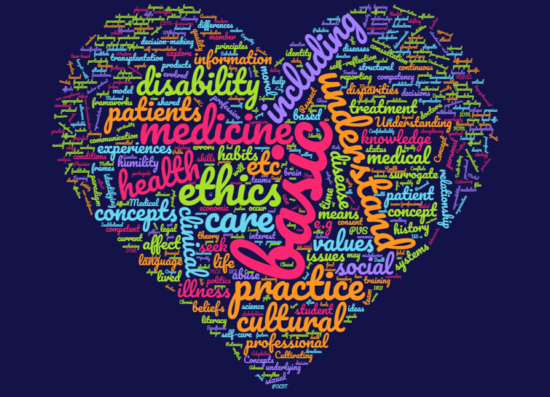Health Humanities Portrait Project
The Health Humanities Portrait Approach is an innovative curricular intervention that enables health professions learners to examine pressing social issues that shape, and are shaped by, experiences of health and illness.
This inventive curricular intervention was formulated by Dr. Sandy Sufian and refined through two years of faculty development workshops funded by the National Endowment for the Humanities.
Overview Heading link
This patient-centered curricular intervention emphasizes patient experiences of illness, contemporary social problems, and their mutual interaction. It assumes these experiences to be multi-dimensional and therefore harnesses different humanities disciplinary methodologies to explore that complexity. It purposefully challenges learners to examine the dialectic between the personal and the structural forces that impact the human condition.
The Approach is grounded in a set of five “critical portraiture” principles that foster humanities-driven analytic skills: texture, perspective-taking, centering the patient, critical composition, and tonality.
Texture
Captures the texture of people’s contexts by organizing a portrait around a social theme, rather than centering it around a diagnosis.
Perspective-taking
Nurtures the critical analysis of the positionality of the narrator, facilitator and/or learner and how “experience” is both based upon, and produces, assumptions, attitudes and identities. Such analysis is an ongoing process of interpretation that resists assumptions.
Centering the Patient
Centers the patient’s voice and her experiential expertise by insisting upon a first-person narrative as the springboard for examining select phenomenon pertinent to the chosen social theme.
Critical Composition
Develops scoping and scaling skills by exploring the bi-directional, dialogical movement between the first-person narrative and humanities scholarship as a way to mirror the relationship between the personal and the structural.
Tonality
Enables learners to develop deep contextual and affective curiosity about how people’s agency and possibilities are mediated by structural conditions. Captures the patient’s nuanced feelings about themselves and the social conditions in their lives.
The Portrait Approach’s pedagogical tool is the Health Humanities Portrait (HHP)
This is the mechanism to foster these analytic skills. The HHP starts with the premise that healthcare training needs to be more deliberately tied to the contextual, ethical, and affective aspects of illness experiences and that it demands a critical examination of storytelling itself. It is distinctively framed around a pressing social theme and utilizes a first-person narrative and scholarship to explore how the dimensions of the personal and the structural are mutually constituted.
The Portrait Approach understands the intellectual purview of health professions education as involving more than technical learning; it provides an alternative yet complementary framework to case-based curricula in health professions curricula by moving learners’ attention from diagnosis to social problems and from physicians to patients, caregivers as located beyond the context of the clinic.

Centering Patients, Revealing Structures: The Health Humanities Portrait Approach Heading link
This paper introduces an innovative curricular approach—the Health Humanities Portrait Approach (Portrait Approach)—and its pedagogical tool—the Health Humanities Portrait (HHP).

Press Release: 05/18/2018 Heading link
Dr. Sandra Sufian Receives National Endowment for the Humanities Grant.
“Human Story of Illness” develops a new approach to health humanities education for physicians-in-training.
Chicago, Illinois: University of Illinois-Chicago professor Sandra Sufian was recently awarded a $100,000 grant from the National Endowment for the Humanities (NEH) Humanities Initiatives for Hispanic-Serving Institutions program, a mechanism intended to strengthen the teaching and study of the humanities in higher education.